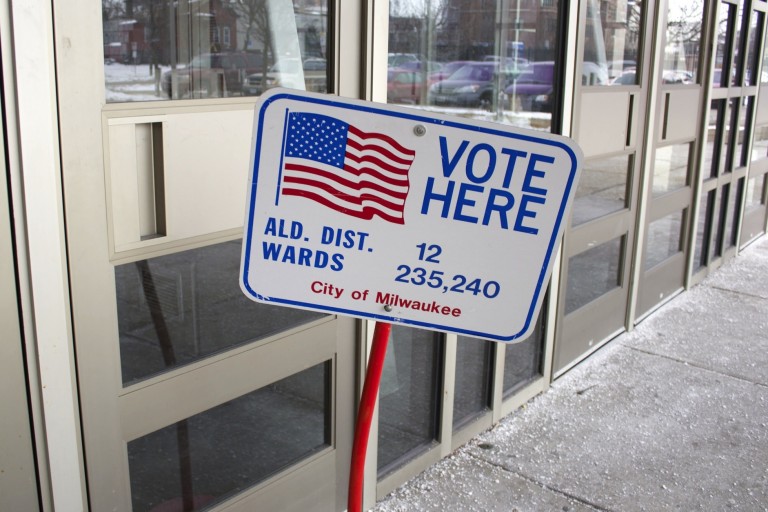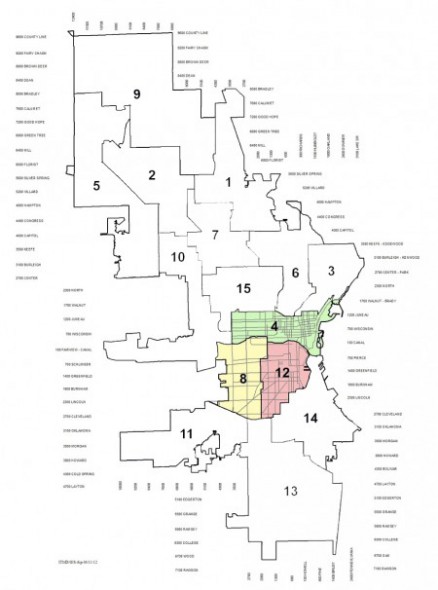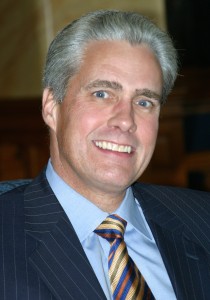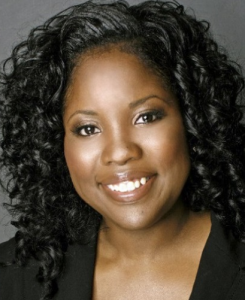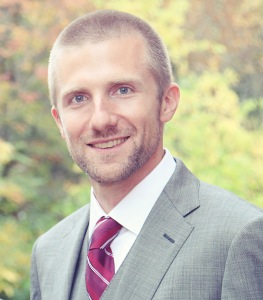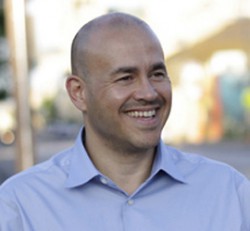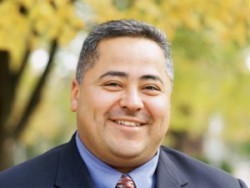Point-Counterpoint for Three Council Races
The views (or non-views) of aldermen Bauman, Donovan and Perez — and their opponents.
Voters in the Milwaukee will have the opportunity to cast a vote in one of 15 local aldermanic races on Tuesday, April 5. Those who are elected will represent their district on the Common Council for a term of four years.
The Milwaukee Neighborhood News Service asked aldermanic candidates in nine central city races to complete a survey addressing neighborhood concerns. Below are responses from candidates in Districts 4, 8 and 12. Candidates in Districts 1 and 7 did not respond to the survey.
We asked the candidates the following four questions. (Note: Some answers have been edited for length.)
1. What is the most pressing issue facing your ward and how would you address it?
2. What special skills or insights would you bring to office if elected?
3. How do you plan to address crime in your neighborhood?
4. What is your plan to attract new businesses and jobs to the community?
District 4: Robert Bauman, Monique Kelly
Robert Bauman (incumbent)
1. The most pressing issue is really a combination of three related issues: economic development, job creation and neighborhood revitalization. I have and will continue to use the legislative process, budgetary process and the city’s economic development tools and job creation programs such as Tax Incremental Financing (TIF), the MORE ordinance (Resident Preference Program, Emerging Business Enterprise Program, etc.), and Transitional Job Program to invest in development and infrastructure projects that have and will create thousands of construction and permanent jobs and have added millions of dollars to the city’s tax base, which is critical to the city’s ability to deliver public services and infrastructure at an affordable tax rate.
With respect to neighborhood revitalization, under my leadership as co-chair of the Joint Committee on the Redevelopment of Abandoned and Foreclosed Homes, chair of the Public Works Committee and member of the Zoning, Neighborhoods & Development Committee the city has invested nearly $70 million since the onset of the great recession in foreclosure mitigation and neighborhood revitalization. I have also sponsored numerous other programs targeted at neighborhood revitalization.
2. I have been a resident of the district for 29 years and have lived at 856 N. 29th Street in the Concordia neighborhood for 19 years. In addition I bring 12 years of experience as the current alderman and prior to my election, I had 27 years of experience as a practicing attorney and owner of a small start-up business. As such I have an intimate knowledge of the district and its neighborhoods and have a diverse background in law and business, an understanding of the challenges facing small businesses, and a thorough knowledge of the city’s legislative process, budgetary process, economic development tools, job creation tools, the real estate development process and land use regulations.
3. I spearheaded the creation of the Near Westside Partners Initiative in my district, which is a collaboration of Marquette University, the Forrest County Potawatomi, Harley-Davidson, Miller-Coors and Aurora Health Care, which has funded the PARC campaign (Promoting Assets Reducing Crime). This campaign has funded a Westside community prosecutor, and police overtime for bike and foot patrols among others. I have been and will continue to be a strong proponent of Community Oriented Policing whereby police interact with the community through foot patrols and bike patrols. I was a strong proponent of the city’s initiative (approved in the 2016 budget) to equip police officers with body cameras.
In addition, I have and will continue to address the causes of crime and disorder through economic development initiatives, job creation initiatives and neighborhood revitalization (see answer to question 1). Finally, I will continue to urge other levels of government such as the state legislature, Department of Public Instruction and Milwaukee School Board to adequately fund public education in Milwaukee, develop innovate programs to insure that our young people stay in school and receive the job skills required for the 21st Century economy, and focus on at-risk youth.
4. I have and will continue to use the city’s economic development tools, such as Tax Incremental Financing, to invest in real estate projects and infrastructure improvements throughout Milwaukee that have created thousands of family- supporting construction and permanent jobs. These investments have included investments in job training programs for central city residents so they can take advantage of these job opportunities.
Monique Kelly
1. Crime. It’s time to organize.
2. I have 15+ years of Human Resource Management, which is my niche while the community is my passion. I will bring a grassroots, ground-up perspective to the position, advocate for seniors, young people, small business and veterans, just to name a few. I will ensure their voice is heard and input is taken into consideration as decisions are being made, and work to increase knowledge, accessibility and opportunities to city services and programs.
3. I believe that there is safety in numbers and power through working together. I want to encourage people to become neighbors again by looking out for one another. Together we will reduce crime, get rid of drug houses, establish ongoing crime prevention techniques and renew citizen interest in community activity. We will develop a united community by simply learning to communicate between police and the citizens again. I am here to help make that connection.
4. My focus will be to help existing entrepreneurs and small business owners create jobs and economic growth.There are entrepreneurs andsmall business owners waiting for the opportunity to simply obtain a license to operate and they’re more than willing to give jobs to people within the community; however, there’s a major power kick involving the current leadership which blocks new business and jobs from developing opportunities. I am ready to open up opportunities for growth and advancement for both the residents and business owners.
District 8: Justin Bielinski, Robert Donovan
Justin Bielinski
1. Ask most 8th District residents what their top concern is, and they will say “safety.” I tend to agree. The district suffered the largest crime increase in the city in 2015, much of it driven by burglaries, car thefts and drug-related crimes. Thankfully, violent crime in the 8th is not nearly as prevalent as in some other parts of the city, but that will be of little comfort to those who have been victimized. The primary reason that safety issues are so prevalent on the near south side is due to institutional neglect. We simply have not been granted the necessary resources by city, county or state government to adequately fund our roads, alleys, parks, schools or services.
Neglected roads damage cars, which make it difficult to get to work. Underfunded schools have difficulty retaining good teachers and overworked parents have a harder time being involved in their children’s education. Neglected maintenance at local parks leads to more littering and less neighborhood pride. Poor police response times and negative police interactions lead to citizens underreporting crimes, which leads to more unsafe neighborhoods. When home repair assistance programs are available to some residents and not others, it leads to a perception that some residents matter less than others, and reduces their faith in the system as a whole. For a safer, better 8th District, we need a leader who will fight to bring our fair share of government resources to the district, and I plan to do just that.
2. My strongest assets are my education and my experience serving youth throughout my 15-year professional career. My bachelor’s degree in history, with a focus on American social and labor history, provides me with a nuanced perspective on our nation’s strengths and our struggles. My graduate certificate in nonprofit management gives me a good working knowledge of the charity sector, which must partner closely and effectively with local government if we are to succeed as a city going forward. My master’s in political science with a focus on local governance has familiarized me with the various tools available to local elected officials to solve urban problems in new and creative ways.
Perhaps even more than formal education, my decade and a half of experience serving local youth in psychiatric residential treatment, outpatient mental health and public education settings have taught me just how pervasive and persistent the struggles of working families in Milwaukee are. Moreover, my work experiences have instilled in me a deep empathy that I believe every politician or community leader must have to adequately address the needs of the people they intend to serve.
3. My plan to address crime in the 8th District boils down to three major initiatives. First, I will expand our current format of holding one safety meeting per month covering the entire MPD District 2 area, from the city limits to Lake Michigan on the near South Side, to holding a separate monthly safety meeting in each of our five distinct neighborhoods (Burnham Park, Layton Park, Clarke Square, Silver City, and Muskego Way).
My second anti-crime initiative is in regards to the slum landlord problem in the 8th District, particularly east of Layton Boulevard (27th Street). Landlords who don’t adequately maintain their properties or respond to neighborhood concerns about their tenants must be sanctioned more strictly and more severely. Additionally, landlords who are otherwise responsible but lack the funds to make needed improvements to their properties must be given access to funding or tax credits to do so.
4. Given the densely populated nature of the 8th District, and the lack of large-scale developable land therein, any significant increase in jobs is going to have to come in other parts of the city that are less developed. A great opportunity for this is the Harbor District, Milwaukee’s next big development frontier, which is located directly to the east of the 8th District. As alderman, I will work to ensure that our district is connected to the job centers of the city, including downtown, the Menomonee Valley and soon the Harbor District, to the greatest degree possible. This means improved roads and public transit.
Within the 8th District itself, we need to focus on smaller-scale, sustainable development. This means providing incentives for city residents to open small businesses, particularly light retail and dining, in our commercial corridors. These include National, Greenfield and Lincoln Avenues, as well as pockets of Burnham and 35th Streets and Muskego and Forest Home Avenues. Specifically, the 8th District is in need of an indoor soccer and recreation facility, a public library and technology center, breakfast cafes, a pizza place and other family-friendly options.
With our proximity to Miller Park, there is no reason we cannot have a more lively National Avenue in Silver City. The pieces are in place with businesses like Bamboo, Thai Barbecue and Our Daily Salt, but we need to do a better job of expanding on these assets.
Robert Donovan (incumbent)
Donovan did not respond to the NNS survey.
District 12: Jose G. Perez, Angel Sanchez
Jose G. Perez (incumbent)
1. My neighbors and friends across the 12th District want to be sure the city is addressing their quality of life. That means we need to keep our roads repaired, plowed and cleaned, our water and sewer systems in top-notch shape, our garbage and recycling pick-ups on time. We need to make sure police have the resources to address crime, to reduce car thefts, burglaries and violent crime, and to prevent crime by closing down drug houses. We need our neighborhoods to be strong, for vacant properties to be sold, rehabbed and occupied, and we need for every resident to have access to good libraries. My goal as alderman is to prioritize our neighborhood’s needs, and add to that smart, strong development that increases the tax base and creates jobs. I do that by staying in touch with the neighborhood, listening to my constituents, and looking for opportunities by working hard. This is a 24-7 job, and that’s what I’ve put into it over the last four years.
2. I have a unique background for an alderman. I started as a community organizer, and worked with kids facing the pressures of joining gangs, labor unions and neighborhood groups. I also had the chance to work on the inside of city government, and I worked as a private developer. All of these experiences let me understand the job of alderman, and the role of city government, in a unique way. I think that’s why I’ve been effective in my first term, and why I’m seen as a leader on the Common Council. I’m not a politician first — I’m a resident, parent, organizer and community leader first.
3. First and foremost, we must build a strong partnership between the local police in our district and community residents. Communication is key. Police need to know where there are potential hot spots or troublemakers, and kids, especially, who could be attracted into committing crimes, need alternatives. I am working at this from multiple angles. We need to create good-paying jobs. We need to improve trust between police and the neighborhood. We have to have smart prevention strategies. We need to support the drug treatment court and diversions that move people out of the cycle of crime and violence. Through my leadership on the finance and personnel committee we funded 20 percent more police officers than originally proposed by the mayor. I also co-sponsored legislation to create Community Service Officers, who will respond to some non-violent complaints and allow police officers more time to focus on other issues.
4. I’m incredibly proud of my record in this area. The new development on 1st and Greenfield is a huge game-changer, and I’ve been the champion of that. I had to challenge the Department of City of Development and force them to confront the truth that their long-term plan was not bearing fruit for our neighborhood. I’m also proud of the PNC Bank on Cesar E. Chavez, the new library and comprehensive health clinic on Mitchell Street, the MATC education campus on 9th & National Avenue, and the streetscape reconstruction of South 5th Street (Washington to Virginia) attracting several new businesses.
We need vision and planning, but we also need to have the guts to change and take advantage of opportunities that are put in front of us. I’ve spent two decades building relationships with both community leaders and developers, and am uniquely positioned to help leverage more growth in our neighborhoods. We will continue to actively recruit businesses to infill our main commercial corridors, we will look for opportunities to leverage major developments like 1st and Greenfield, and we will target city resources for maximum growth.
Angel Sanchez
1. The most pressing issue in the community is the homeowners and investors being targeted by the Department of Neighborhood Services. While they have cause to issue orders, their fines and timetables are unrealistic in some cases and are simply not practical. Some work orders go beyond the financial means of families, yet the city fines them, turns the case over to a debt collection law firm and eventually, if not resolved, the city takes the home away from the owner.
Crime is out of control everywhere. People’s cars are being stolen, their homes are being broken into and fights erupt in the middle of the day on our streets. We need to get more people employed and educated. Our judicial system must send a message that if you commit a crime, you must do your time. Currently, many violations are treated lightly and the offenders are back on the street the next day.
2. I’m highly educated, a great communicator and listener, have owned and understand what it takes to run a business and solve problems. I have worked in the government sector and in the nonprofit sector.
I am highly successful, own eight properties in Milwaukee and believe in financial literacy, freedom and independence. I can do anything I set my mind to, and have motivated others to reach for the sky. I love people and there is plenty of room in our neighborhood for people of all walks of life.
3. See answer one.
4. People began to take a serious look at the South Side of Milwaukee when I became alderman from 2000 to 2004. We led with $300 million of economic development. Back then I had to sell a vision when the tumbleweeds would blow by while downtown Milwaukee would get another $5 million for street improvements. Our restaurants were doing almost as much business as downtown.
I kept quiet and made it a priority to beat every district in our city with development. The business community knew that I was a huge believer in business and far from a micro-manager. My vision created lots of jobs, we increased the tax base, there was plenty of construction dollars invested and this neighborhood became a destination area to live work and play. Sixteenth Street became Cesar Chavez Drive, full of diversity, shopping and restaurants; Lincoln Avenue, once full of boarded-up store fronts, got revitalized and Walker’s Point came back to life offering condominiums, assisted living, arts and theaters.
There is still room for growth with services and venues. It must be a balance between the needs of the community and its stakeholders.
This story was originally published by Milwaukee Neighborhood News Service, where you can find other stories reporting on fifteen city neighborhoods in Milwaukee.
Political Contributions Tracker
Displaying political contributions between people mentioned in this story. Learn more.


